Victoria University: Analyzing Director's Defences Regime in Australia
VerifiedAdded on 2023/03/30
|10
|2307
|109
Essay
AI Summary
This essay critically examines the effectiveness of the current director's defences regime in Australia, focusing on its ability to create a safe space for director decision-making and foster an entrepreneurial spirit. It discusses the scope of liabilities for directors under the Corporations Act 2001 (Cth), other legal provisions, and general law obligations, as well as available reliefs provided by the court. The analysis includes a discussion of the 'safe harbour' advice under section 588GA and its implications. The essay concludes by arguing for a regulatory environment that encourages honesty and innovation, suggesting the need for reasonable and fair director defences within the Corporations Act 2001 to promote effectiveness and international competitiveness. Desklib offers a range of study tools and past papers to support students in their academic endeavors.
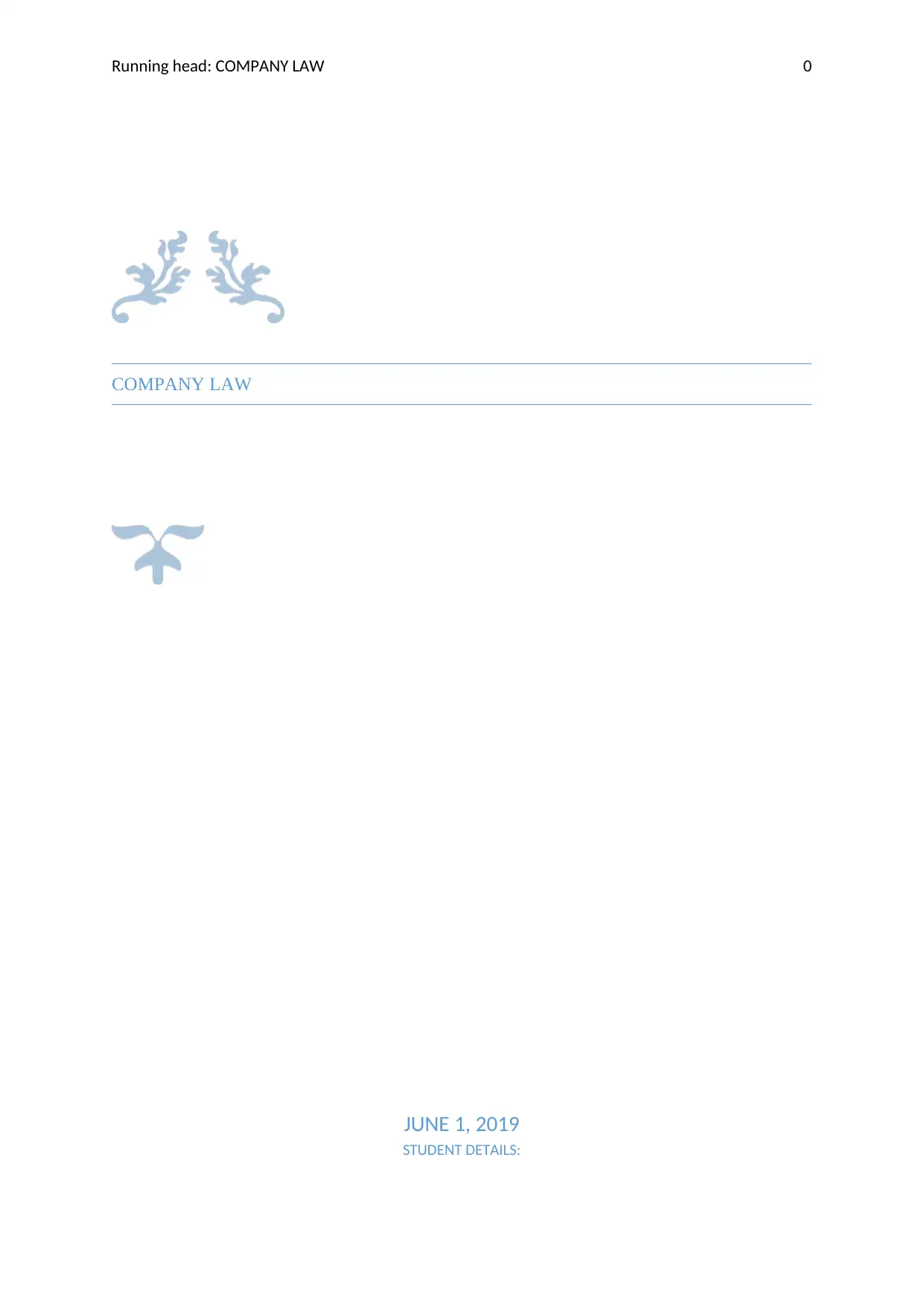
Running head: COMPANY LAW 0
COMPANY LAW
JUNE 1, 2019
STUDENT DETAILS:
COMPANY LAW
JUNE 1, 2019
STUDENT DETAILS:
Paraphrase This Document
Need a fresh take? Get an instant paraphrase of this document with our AI Paraphraser
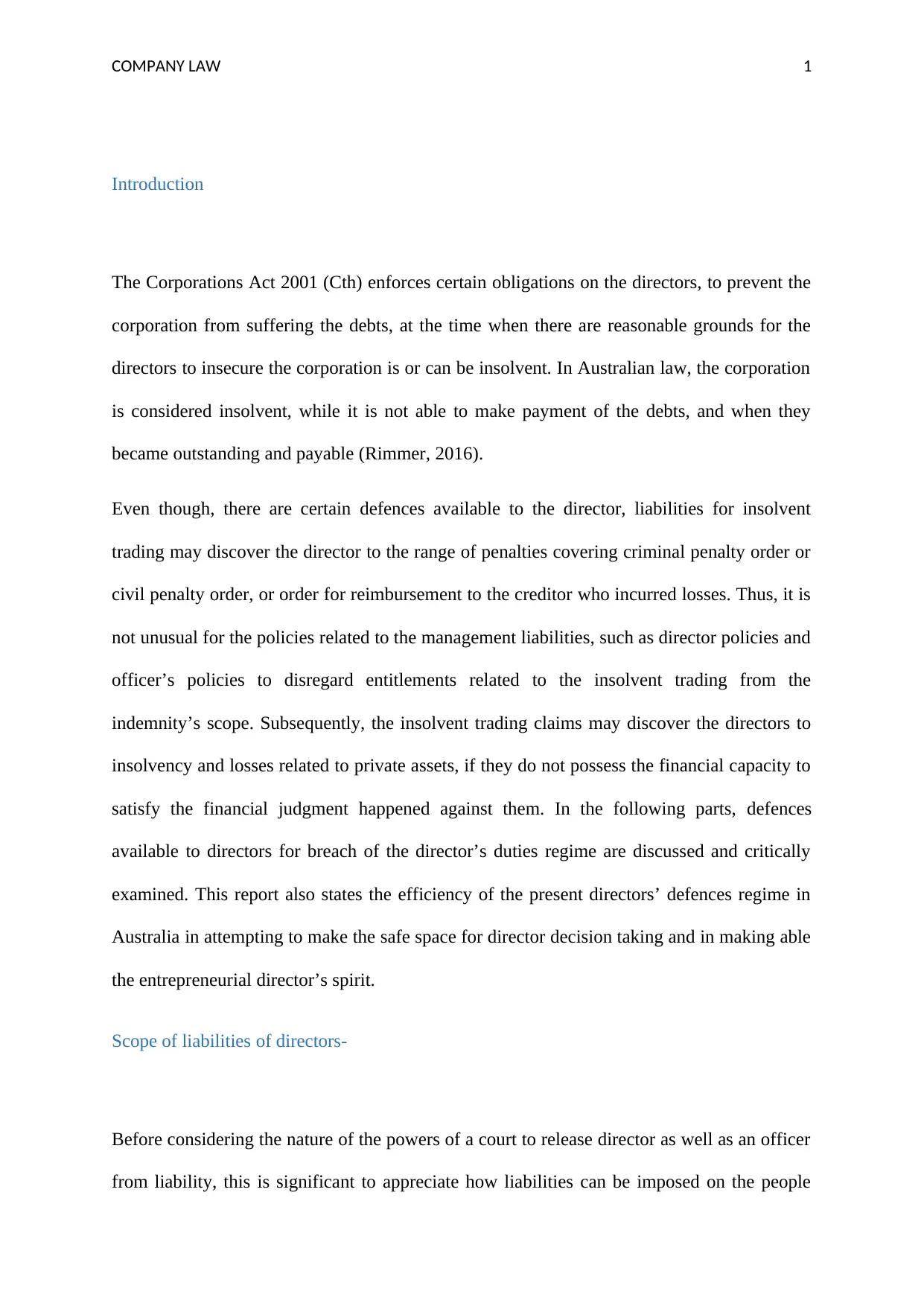
COMPANY LAW 1
Introduction
The Corporations Act 2001 (Cth) enforces certain obligations on the directors, to prevent the
corporation from suffering the debts, at the time when there are reasonable grounds for the
directors to insecure the corporation is or can be insolvent. In Australian law, the corporation
is considered insolvent, while it is not able to make payment of the debts, and when they
became outstanding and payable (Rimmer, 2016).
Even though, there are certain defences available to the director, liabilities for insolvent
trading may discover the director to the range of penalties covering criminal penalty order or
civil penalty order, or order for reimbursement to the creditor who incurred losses. Thus, it is
not unusual for the policies related to the management liabilities, such as director policies and
officer’s policies to disregard entitlements related to the insolvent trading from the
indemnity’s scope. Subsequently, the insolvent trading claims may discover the directors to
insolvency and losses related to private assets, if they do not possess the financial capacity to
satisfy the financial judgment happened against them. In the following parts, defences
available to directors for breach of the director’s duties regime are discussed and critically
examined. This report also states the efficiency of the present directors’ defences regime in
Australia in attempting to make the safe space for director decision taking and in making able
the entrepreneurial director’s spirit.
Scope of liabilities of directors-
Before considering the nature of the powers of a court to release director as well as an officer
from liability, this is significant to appreciate how liabilities can be imposed on the people
Introduction
The Corporations Act 2001 (Cth) enforces certain obligations on the directors, to prevent the
corporation from suffering the debts, at the time when there are reasonable grounds for the
directors to insecure the corporation is or can be insolvent. In Australian law, the corporation
is considered insolvent, while it is not able to make payment of the debts, and when they
became outstanding and payable (Rimmer, 2016).
Even though, there are certain defences available to the director, liabilities for insolvent
trading may discover the director to the range of penalties covering criminal penalty order or
civil penalty order, or order for reimbursement to the creditor who incurred losses. Thus, it is
not unusual for the policies related to the management liabilities, such as director policies and
officer’s policies to disregard entitlements related to the insolvent trading from the
indemnity’s scope. Subsequently, the insolvent trading claims may discover the directors to
insolvency and losses related to private assets, if they do not possess the financial capacity to
satisfy the financial judgment happened against them. In the following parts, defences
available to directors for breach of the director’s duties regime are discussed and critically
examined. This report also states the efficiency of the present directors’ defences regime in
Australia in attempting to make the safe space for director decision taking and in making able
the entrepreneurial director’s spirit.
Scope of liabilities of directors-
Before considering the nature of the powers of a court to release director as well as an officer
from liability, this is significant to appreciate how liabilities can be imposed on the people
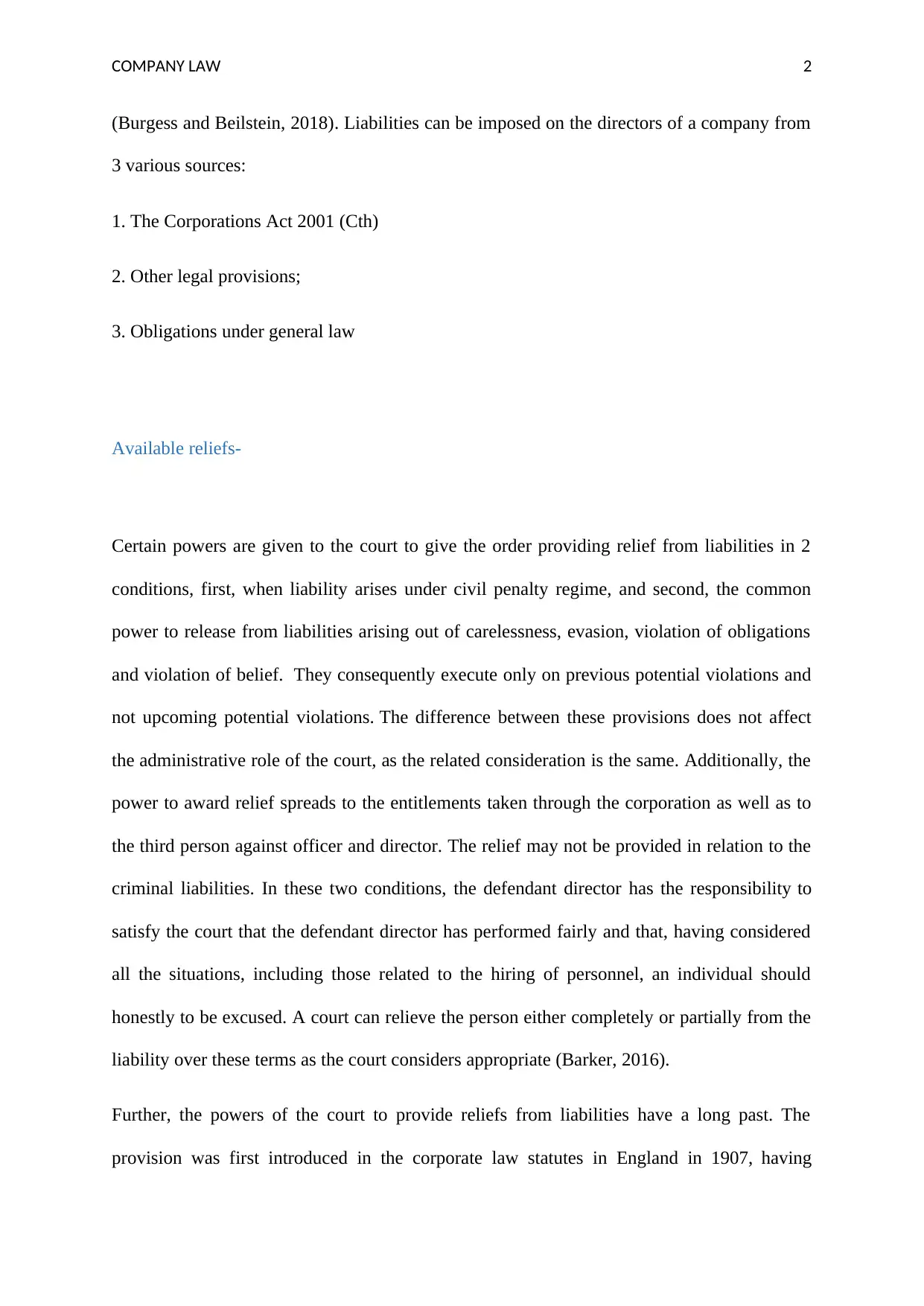
COMPANY LAW 2
(Burgess and Beilstein, 2018). Liabilities can be imposed on the directors of a company from
3 various sources:
1. The Corporations Act 2001 (Cth)
2. Other legal provisions;
3. Obligations under general law
Available reliefs-
Certain powers are given to the court to give the order providing relief from liabilities in 2
conditions, first, when liability arises under civil penalty regime, and second, the common
power to release from liabilities arising out of carelessness, evasion, violation of obligations
and violation of belief. They consequently execute only on previous potential violations and
not upcoming potential violations. The difference between these provisions does not affect
the administrative role of the court, as the related consideration is the same. Additionally, the
power to award relief spreads to the entitlements taken through the corporation as well as to
the third person against officer and director. The relief may not be provided in relation to the
criminal liabilities. In these two conditions, the defendant director has the responsibility to
satisfy the court that the defendant director has performed fairly and that, having considered
all the situations, including those related to the hiring of personnel, an individual should
honestly to be excused. A court can relieve the person either completely or partially from the
liability over these terms as the court considers appropriate (Barker, 2016).
Further, the powers of the court to provide reliefs from liabilities have a long past. The
provision was first introduced in the corporate law statutes in England in 1907, having
(Burgess and Beilstein, 2018). Liabilities can be imposed on the directors of a company from
3 various sources:
1. The Corporations Act 2001 (Cth)
2. Other legal provisions;
3. Obligations under general law
Available reliefs-
Certain powers are given to the court to give the order providing relief from liabilities in 2
conditions, first, when liability arises under civil penalty regime, and second, the common
power to release from liabilities arising out of carelessness, evasion, violation of obligations
and violation of belief. They consequently execute only on previous potential violations and
not upcoming potential violations. The difference between these provisions does not affect
the administrative role of the court, as the related consideration is the same. Additionally, the
power to award relief spreads to the entitlements taken through the corporation as well as to
the third person against officer and director. The relief may not be provided in relation to the
criminal liabilities. In these two conditions, the defendant director has the responsibility to
satisfy the court that the defendant director has performed fairly and that, having considered
all the situations, including those related to the hiring of personnel, an individual should
honestly to be excused. A court can relieve the person either completely or partially from the
liability over these terms as the court considers appropriate (Barker, 2016).
Further, the powers of the court to provide reliefs from liabilities have a long past. The
provision was first introduced in the corporate law statutes in England in 1907, having
⊘ This is a preview!⊘
Do you want full access?
Subscribe today to unlock all pages.

Trusted by 1+ million students worldwide
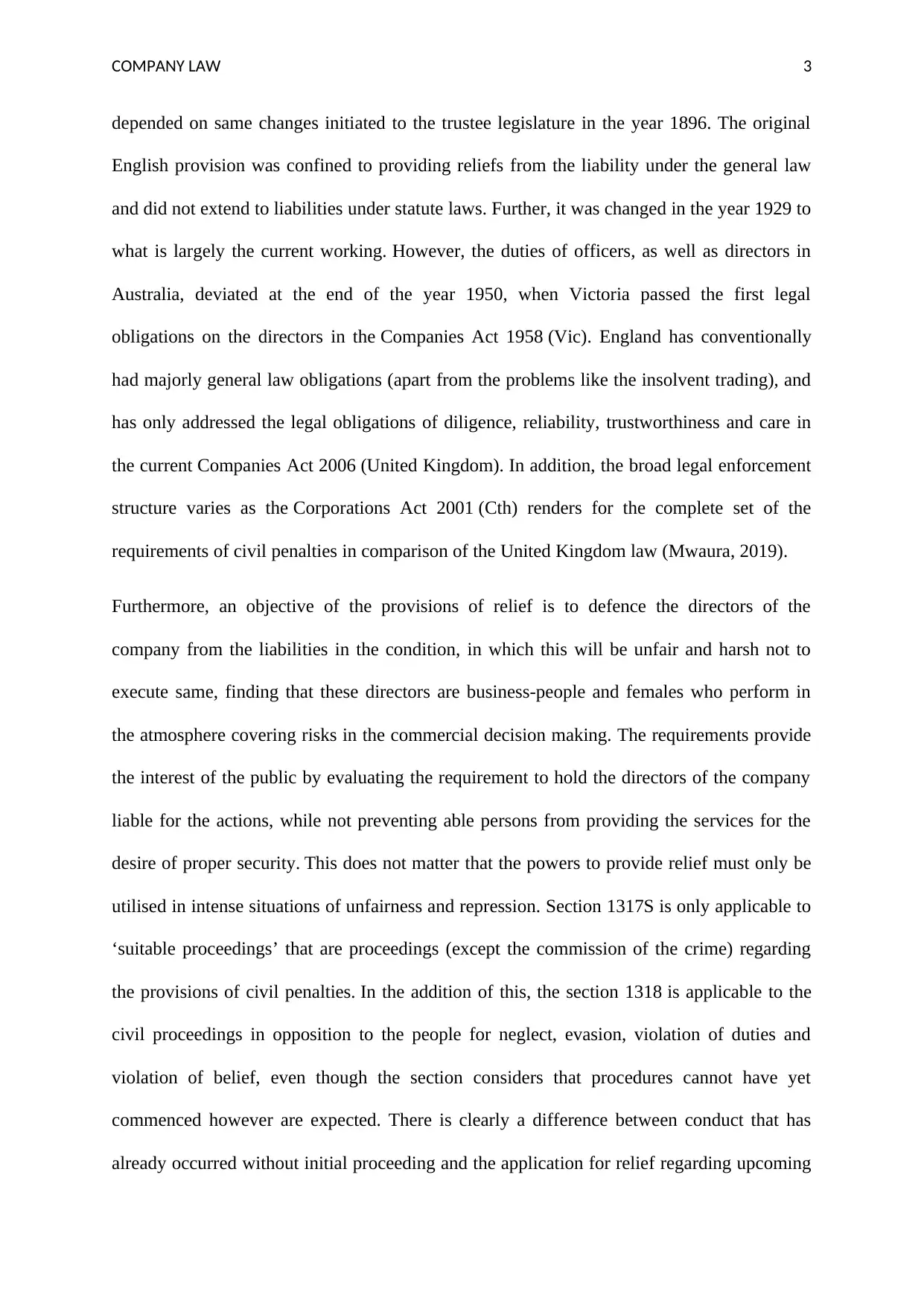
COMPANY LAW 3
depended on same changes initiated to the trustee legislature in the year 1896. The original
English provision was confined to providing reliefs from the liability under the general law
and did not extend to liabilities under statute laws. Further, it was changed in the year 1929 to
what is largely the current working. However, the duties of officers, as well as directors in
Australia, deviated at the end of the year 1950, when Victoria passed the first legal
obligations on the directors in the Companies Act 1958 (Vic). England has conventionally
had majorly general law obligations (apart from the problems like the insolvent trading), and
has only addressed the legal obligations of diligence, reliability, trustworthiness and care in
the current Companies Act 2006 (United Kingdom). In addition, the broad legal enforcement
structure varies as the Corporations Act 2001 (Cth) renders for the complete set of the
requirements of civil penalties in comparison of the United Kingdom law (Mwaura, 2019).
Furthermore, an objective of the provisions of relief is to defence the directors of the
company from the liabilities in the condition, in which this will be unfair and harsh not to
execute same, finding that these directors are business-people and females who perform in
the atmosphere covering risks in the commercial decision making. The requirements provide
the interest of the public by evaluating the requirement to hold the directors of the company
liable for the actions, while not preventing able persons from providing the services for the
desire of proper security. This does not matter that the powers to provide relief must only be
utilised in intense situations of unfairness and repression. Section 1317S is only applicable to
‘suitable proceedings’ that are proceedings (except the commission of the crime) regarding
the provisions of civil penalties. In the addition of this, the section 1318 is applicable to the
civil proceedings in opposition to the people for neglect, evasion, violation of duties and
violation of belief, even though the section considers that procedures cannot have yet
commenced however are expected. There is clearly a difference between conduct that has
already occurred without initial proceeding and the application for relief regarding upcoming
depended on same changes initiated to the trustee legislature in the year 1896. The original
English provision was confined to providing reliefs from the liability under the general law
and did not extend to liabilities under statute laws. Further, it was changed in the year 1929 to
what is largely the current working. However, the duties of officers, as well as directors in
Australia, deviated at the end of the year 1950, when Victoria passed the first legal
obligations on the directors in the Companies Act 1958 (Vic). England has conventionally
had majorly general law obligations (apart from the problems like the insolvent trading), and
has only addressed the legal obligations of diligence, reliability, trustworthiness and care in
the current Companies Act 2006 (United Kingdom). In addition, the broad legal enforcement
structure varies as the Corporations Act 2001 (Cth) renders for the complete set of the
requirements of civil penalties in comparison of the United Kingdom law (Mwaura, 2019).
Furthermore, an objective of the provisions of relief is to defence the directors of the
company from the liabilities in the condition, in which this will be unfair and harsh not to
execute same, finding that these directors are business-people and females who perform in
the atmosphere covering risks in the commercial decision making. The requirements provide
the interest of the public by evaluating the requirement to hold the directors of the company
liable for the actions, while not preventing able persons from providing the services for the
desire of proper security. This does not matter that the powers to provide relief must only be
utilised in intense situations of unfairness and repression. Section 1317S is only applicable to
‘suitable proceedings’ that are proceedings (except the commission of the crime) regarding
the provisions of civil penalties. In the addition of this, the section 1318 is applicable to the
civil proceedings in opposition to the people for neglect, evasion, violation of duties and
violation of belief, even though the section considers that procedures cannot have yet
commenced however are expected. There is clearly a difference between conduct that has
already occurred without initial proceeding and the application for relief regarding upcoming
Paraphrase This Document
Need a fresh take? Get an instant paraphrase of this document with our AI Paraphraser
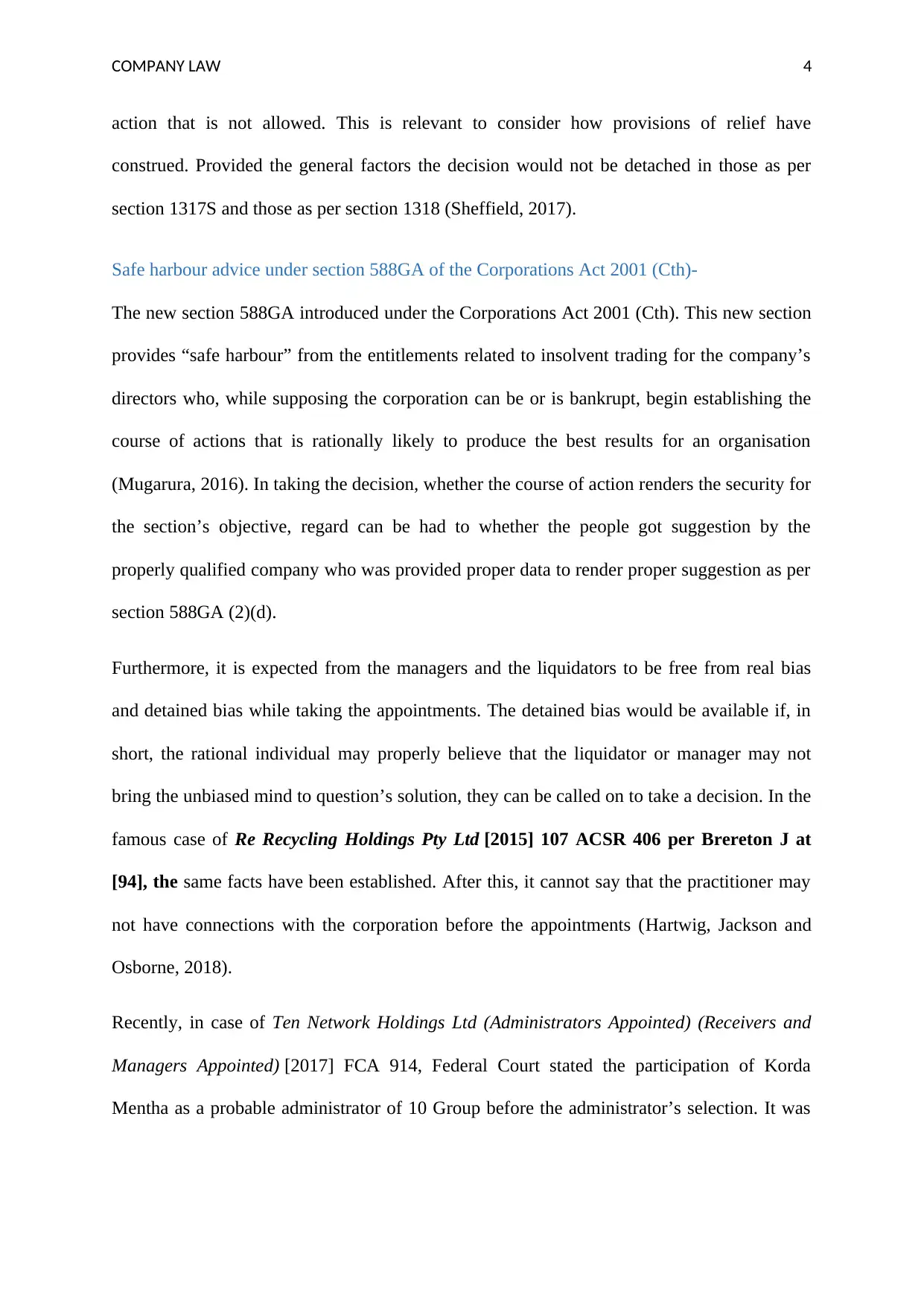
COMPANY LAW 4
action that is not allowed. This is relevant to consider how provisions of relief have
construed. Provided the general factors the decision would not be detached in those as per
section 1317S and those as per section 1318 (Sheffield, 2017).
Safe harbour advice under section 588GA of the Corporations Act 2001 (Cth)-
The new section 588GA introduced under the Corporations Act 2001 (Cth). This new section
provides “safe harbour” from the entitlements related to insolvent trading for the company’s
directors who, while supposing the corporation can be or is bankrupt, begin establishing the
course of actions that is rationally likely to produce the best results for an organisation
(Mugarura, 2016). In taking the decision, whether the course of action renders the security for
the section’s objective, regard can be had to whether the people got suggestion by the
properly qualified company who was provided proper data to render proper suggestion as per
section 588GA (2)(d).
Furthermore, it is expected from the managers and the liquidators to be free from real bias
and detained bias while taking the appointments. The detained bias would be available if, in
short, the rational individual may properly believe that the liquidator or manager may not
bring the unbiased mind to question’s solution, they can be called on to take a decision. In the
famous case of Re Recycling Holdings Pty Ltd [2015] 107 ACSR 406 per Brereton J at
[94], the same facts have been established. After this, it cannot say that the practitioner may
not have connections with the corporation before the appointments (Hartwig, Jackson and
Osborne, 2018).
Recently, in case of Ten Network Holdings Ltd (Administrators Appointed) (Receivers and
Managers Appointed) [2017] FCA 914, Federal Court stated the participation of Korda
Mentha as a probable administrator of 10 Group before the administrator’s selection. It was
action that is not allowed. This is relevant to consider how provisions of relief have
construed. Provided the general factors the decision would not be detached in those as per
section 1317S and those as per section 1318 (Sheffield, 2017).
Safe harbour advice under section 588GA of the Corporations Act 2001 (Cth)-
The new section 588GA introduced under the Corporations Act 2001 (Cth). This new section
provides “safe harbour” from the entitlements related to insolvent trading for the company’s
directors who, while supposing the corporation can be or is bankrupt, begin establishing the
course of actions that is rationally likely to produce the best results for an organisation
(Mugarura, 2016). In taking the decision, whether the course of action renders the security for
the section’s objective, regard can be had to whether the people got suggestion by the
properly qualified company who was provided proper data to render proper suggestion as per
section 588GA (2)(d).
Furthermore, it is expected from the managers and the liquidators to be free from real bias
and detained bias while taking the appointments. The detained bias would be available if, in
short, the rational individual may properly believe that the liquidator or manager may not
bring the unbiased mind to question’s solution, they can be called on to take a decision. In the
famous case of Re Recycling Holdings Pty Ltd [2015] 107 ACSR 406 per Brereton J at
[94], the same facts have been established. After this, it cannot say that the practitioner may
not have connections with the corporation before the appointments (Hartwig, Jackson and
Osborne, 2018).
Recently, in case of Ten Network Holdings Ltd (Administrators Appointed) (Receivers and
Managers Appointed) [2017] FCA 914, Federal Court stated the participation of Korda
Mentha as a probable administrator of 10 Group before the administrator’s selection. It was
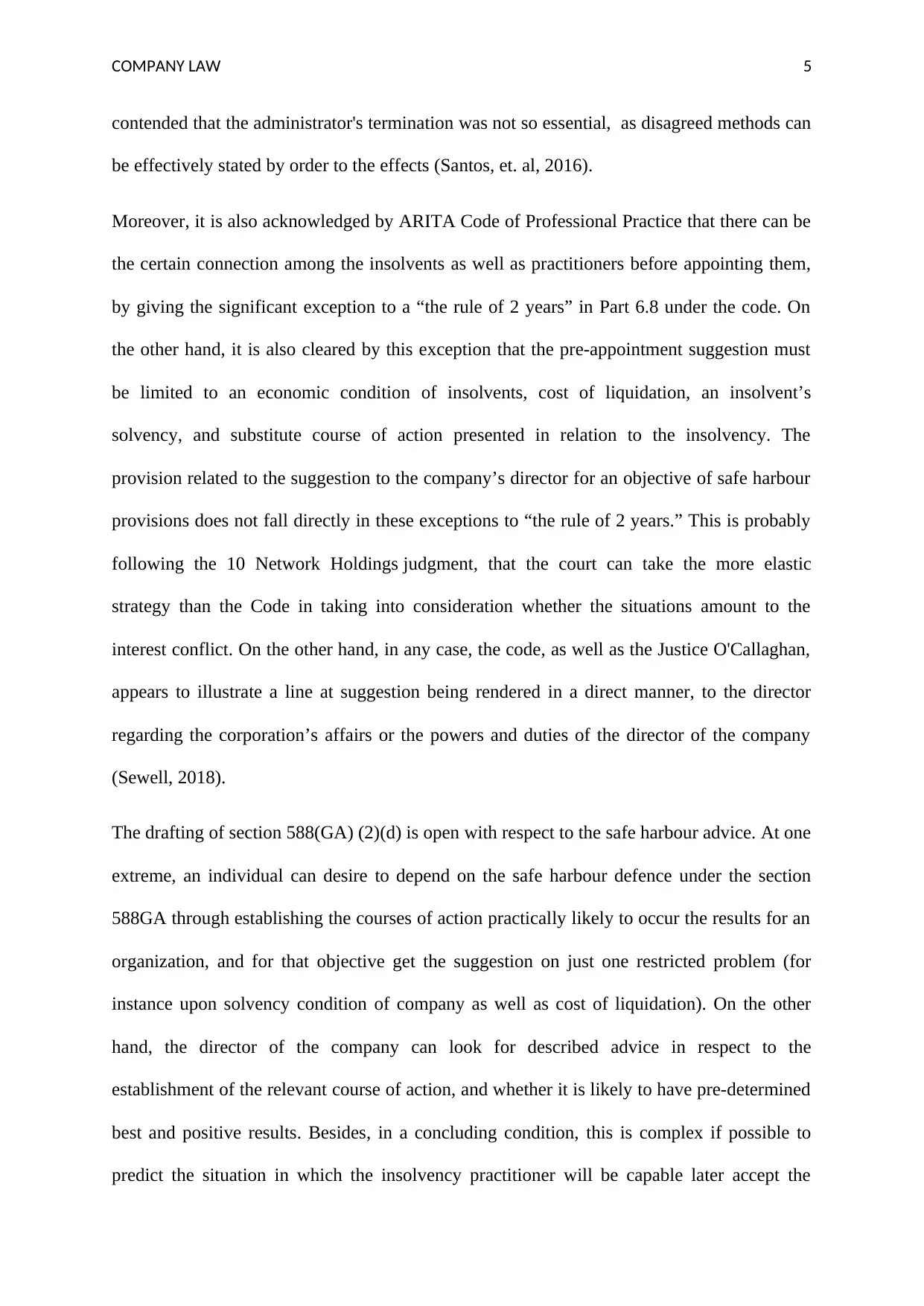
COMPANY LAW 5
contended that the administrator's termination was not so essential, as disagreed methods can
be effectively stated by order to the effects (Santos, et. al, 2016).
Moreover, it is also acknowledged by ARITA Code of Professional Practice that there can be
the certain connection among the insolvents as well as practitioners before appointing them,
by giving the significant exception to a “the rule of 2 years” in Part 6.8 under the code. On
the other hand, it is also cleared by this exception that the pre-appointment suggestion must
be limited to an economic condition of insolvents, cost of liquidation, an insolvent’s
solvency, and substitute course of action presented in relation to the insolvency. The
provision related to the suggestion to the company’s director for an objective of safe harbour
provisions does not fall directly in these exceptions to “the rule of 2 years.” This is probably
following the 10 Network Holdings judgment, that the court can take the more elastic
strategy than the Code in taking into consideration whether the situations amount to the
interest conflict. On the other hand, in any case, the code, as well as the Justice O'Callaghan,
appears to illustrate a line at suggestion being rendered in a direct manner, to the director
regarding the corporation’s affairs or the powers and duties of the director of the company
(Sewell, 2018).
The drafting of section 588(GA) (2)(d) is open with respect to the safe harbour advice. At one
extreme, an individual can desire to depend on the safe harbour defence under the section
588GA through establishing the courses of action practically likely to occur the results for an
organization, and for that objective get the suggestion on just one restricted problem (for
instance upon solvency condition of company as well as cost of liquidation). On the other
hand, the director of the company can look for described advice in respect to the
establishment of the relevant course of action, and whether it is likely to have pre-determined
best and positive results. Besides, in a concluding condition, this is complex if possible to
predict the situation in which the insolvency practitioner will be capable later accept the
contended that the administrator's termination was not so essential, as disagreed methods can
be effectively stated by order to the effects (Santos, et. al, 2016).
Moreover, it is also acknowledged by ARITA Code of Professional Practice that there can be
the certain connection among the insolvents as well as practitioners before appointing them,
by giving the significant exception to a “the rule of 2 years” in Part 6.8 under the code. On
the other hand, it is also cleared by this exception that the pre-appointment suggestion must
be limited to an economic condition of insolvents, cost of liquidation, an insolvent’s
solvency, and substitute course of action presented in relation to the insolvency. The
provision related to the suggestion to the company’s director for an objective of safe harbour
provisions does not fall directly in these exceptions to “the rule of 2 years.” This is probably
following the 10 Network Holdings judgment, that the court can take the more elastic
strategy than the Code in taking into consideration whether the situations amount to the
interest conflict. On the other hand, in any case, the code, as well as the Justice O'Callaghan,
appears to illustrate a line at suggestion being rendered in a direct manner, to the director
regarding the corporation’s affairs or the powers and duties of the director of the company
(Sewell, 2018).
The drafting of section 588(GA) (2)(d) is open with respect to the safe harbour advice. At one
extreme, an individual can desire to depend on the safe harbour defence under the section
588GA through establishing the courses of action practically likely to occur the results for an
organization, and for that objective get the suggestion on just one restricted problem (for
instance upon solvency condition of company as well as cost of liquidation). On the other
hand, the director of the company can look for described advice in respect to the
establishment of the relevant course of action, and whether it is likely to have pre-determined
best and positive results. Besides, in a concluding condition, this is complex if possible to
predict the situation in which the insolvency practitioner will be capable later accept the
⊘ This is a preview!⊘
Do you want full access?
Subscribe today to unlock all pages.

Trusted by 1+ million students worldwide
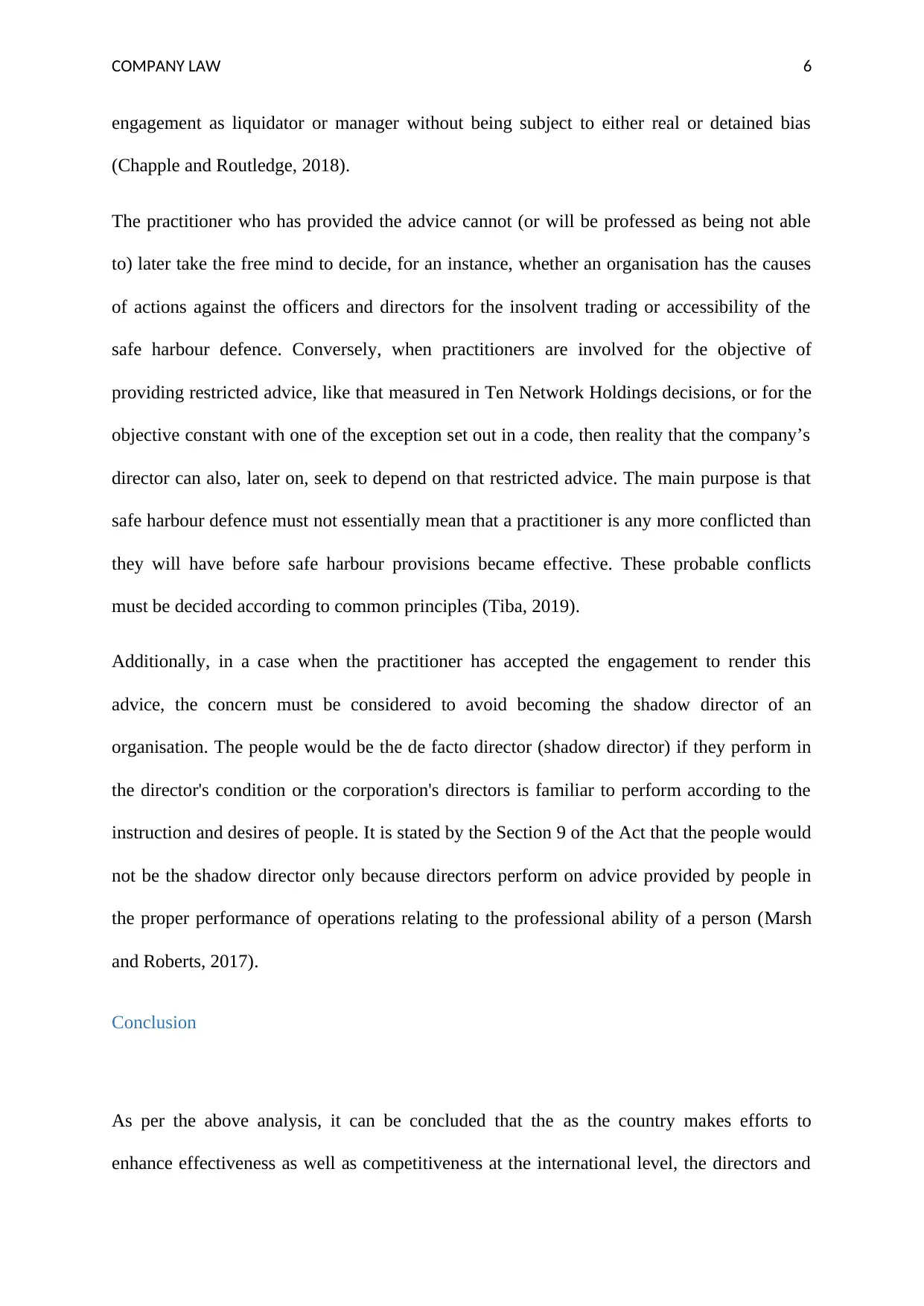
COMPANY LAW 6
engagement as liquidator or manager without being subject to either real or detained bias
(Chapple and Routledge, 2018).
The practitioner who has provided the advice cannot (or will be professed as being not able
to) later take the free mind to decide, for an instance, whether an organisation has the causes
of actions against the officers and directors for the insolvent trading or accessibility of the
safe harbour defence. Conversely, when practitioners are involved for the objective of
providing restricted advice, like that measured in Ten Network Holdings decisions, or for the
objective constant with one of the exception set out in a code, then reality that the company’s
director can also, later on, seek to depend on that restricted advice. The main purpose is that
safe harbour defence must not essentially mean that a practitioner is any more conflicted than
they will have before safe harbour provisions became effective. These probable conflicts
must be decided according to common principles (Tiba, 2019).
Additionally, in a case when the practitioner has accepted the engagement to render this
advice, the concern must be considered to avoid becoming the shadow director of an
organisation. The people would be the de facto director (shadow director) if they perform in
the director's condition or the corporation's directors is familiar to perform according to the
instruction and desires of people. It is stated by the Section 9 of the Act that the people would
not be the shadow director only because directors perform on advice provided by people in
the proper performance of operations relating to the professional ability of a person (Marsh
and Roberts, 2017).
Conclusion
As per the above analysis, it can be concluded that the as the country makes efforts to
enhance effectiveness as well as competitiveness at the international level, the directors and
engagement as liquidator or manager without being subject to either real or detained bias
(Chapple and Routledge, 2018).
The practitioner who has provided the advice cannot (or will be professed as being not able
to) later take the free mind to decide, for an instance, whether an organisation has the causes
of actions against the officers and directors for the insolvent trading or accessibility of the
safe harbour defence. Conversely, when practitioners are involved for the objective of
providing restricted advice, like that measured in Ten Network Holdings decisions, or for the
objective constant with one of the exception set out in a code, then reality that the company’s
director can also, later on, seek to depend on that restricted advice. The main purpose is that
safe harbour defence must not essentially mean that a practitioner is any more conflicted than
they will have before safe harbour provisions became effective. These probable conflicts
must be decided according to common principles (Tiba, 2019).
Additionally, in a case when the practitioner has accepted the engagement to render this
advice, the concern must be considered to avoid becoming the shadow director of an
organisation. The people would be the de facto director (shadow director) if they perform in
the director's condition or the corporation's directors is familiar to perform according to the
instruction and desires of people. It is stated by the Section 9 of the Act that the people would
not be the shadow director only because directors perform on advice provided by people in
the proper performance of operations relating to the professional ability of a person (Marsh
and Roberts, 2017).
Conclusion
As per the above analysis, it can be concluded that the as the country makes efforts to
enhance effectiveness as well as competitiveness at the international level, the directors and
Paraphrase This Document
Need a fresh take? Get an instant paraphrase of this document with our AI Paraphraser
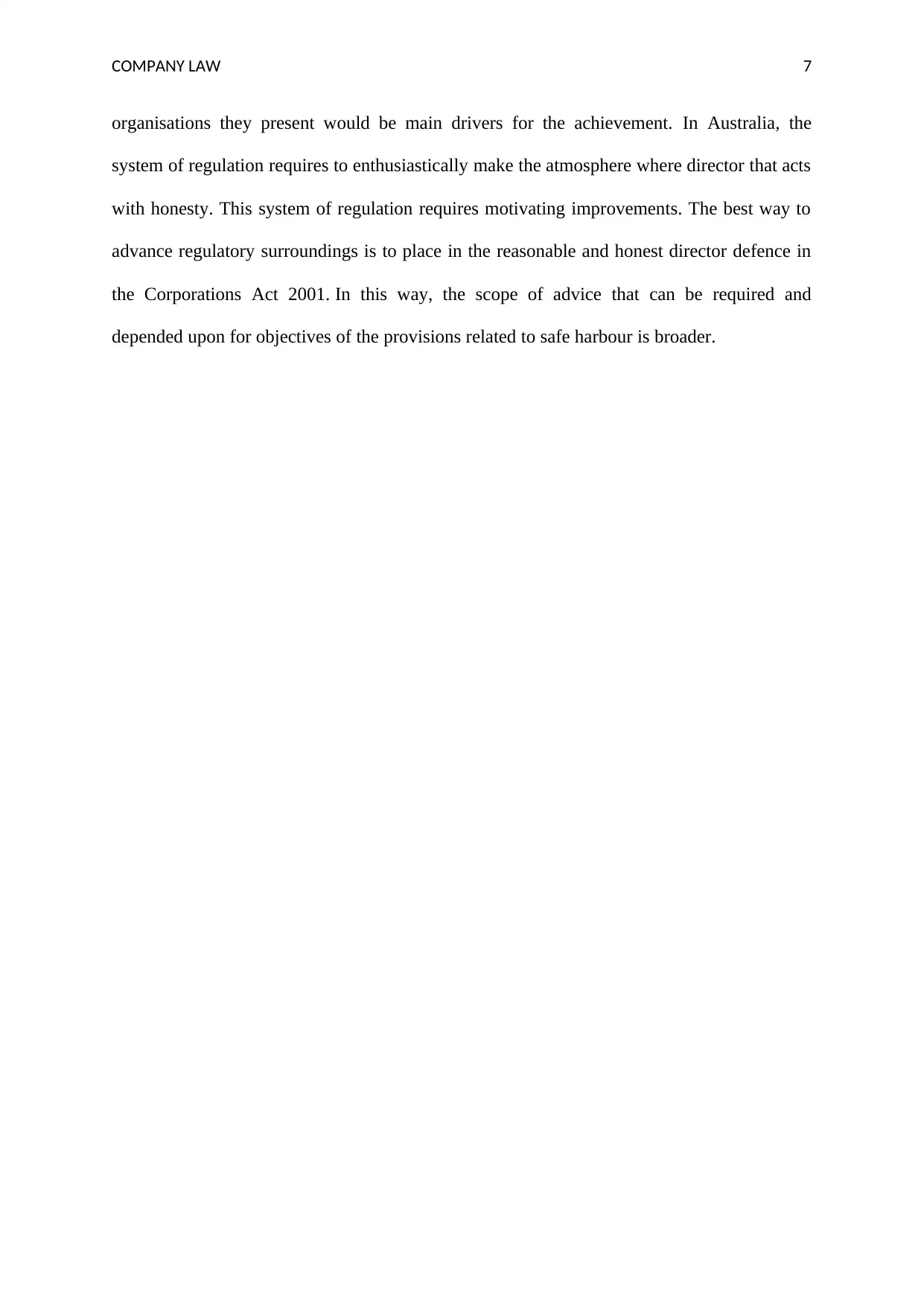
COMPANY LAW 7
organisations they present would be main drivers for the achievement. In Australia, the
system of regulation requires to enthusiastically make the atmosphere where director that acts
with honesty. This system of regulation requires motivating improvements. The best way to
advance regulatory surroundings is to place in the reasonable and honest director defence in
the Corporations Act 2001. In this way, the scope of advice that can be required and
depended upon for objectives of the provisions related to safe harbour is broader.
organisations they present would be main drivers for the achievement. In Australia, the
system of regulation requires to enthusiastically make the atmosphere where director that acts
with honesty. This system of regulation requires motivating improvements. The best way to
advance regulatory surroundings is to place in the reasonable and honest director defence in
the Corporations Act 2001. In this way, the scope of advice that can be required and
depended upon for objectives of the provisions related to safe harbour is broader.
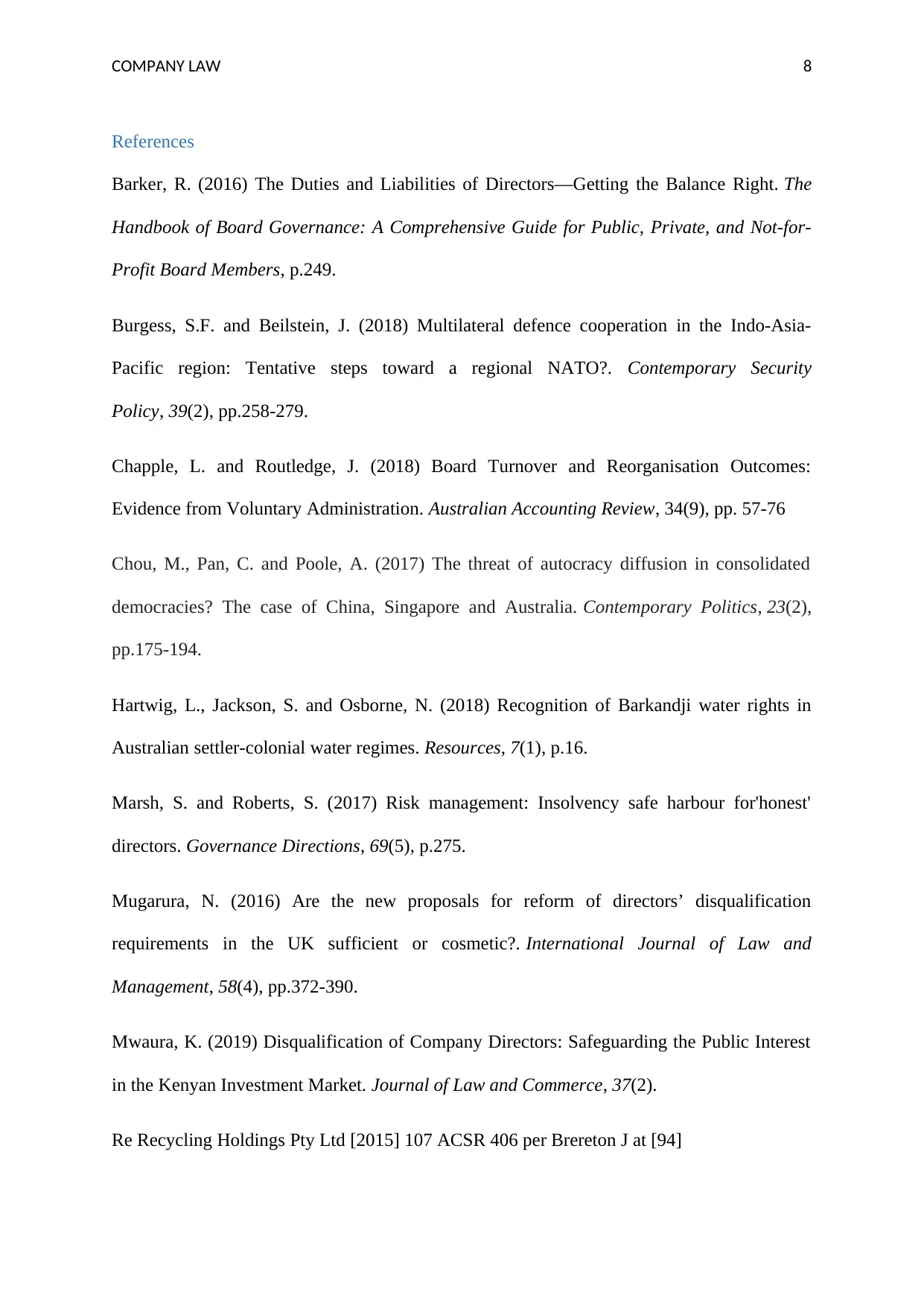
COMPANY LAW 8
References
Barker, R. (2016) The Duties and Liabilities of Directors—Getting the Balance Right. The
Handbook of Board Governance: A Comprehensive Guide for Public, Private, and Not-for-
Profit Board Members, p.249.
Burgess, S.F. and Beilstein, J. (2018) Multilateral defence cooperation in the Indo-Asia-
Pacific region: Tentative steps toward a regional NATO?. Contemporary Security
Policy, 39(2), pp.258-279.
Chapple, L. and Routledge, J. (2018) Board Turnover and Reorganisation Outcomes:
Evidence from Voluntary Administration. Australian Accounting Review, 34(9), pp. 57-76
Chou, M., Pan, C. and Poole, A. (2017) The threat of autocracy diffusion in consolidated
democracies? The case of China, Singapore and Australia. Contemporary Politics, 23(2),
pp.175-194.
Hartwig, L., Jackson, S. and Osborne, N. (2018) Recognition of Barkandji water rights in
Australian settler-colonial water regimes. Resources, 7(1), p.16.
Marsh, S. and Roberts, S. (2017) Risk management: Insolvency safe harbour for'honest'
directors. Governance Directions, 69(5), p.275.
Mugarura, N. (2016) Are the new proposals for reform of directors’ disqualification
requirements in the UK sufficient or cosmetic?. International Journal of Law and
Management, 58(4), pp.372-390.
Mwaura, K. (2019) Disqualification of Company Directors: Safeguarding the Public Interest
in the Kenyan Investment Market. Journal of Law and Commerce, 37(2).
Re Recycling Holdings Pty Ltd [2015] 107 ACSR 406 per Brereton J at [94]
References
Barker, R. (2016) The Duties and Liabilities of Directors—Getting the Balance Right. The
Handbook of Board Governance: A Comprehensive Guide for Public, Private, and Not-for-
Profit Board Members, p.249.
Burgess, S.F. and Beilstein, J. (2018) Multilateral defence cooperation in the Indo-Asia-
Pacific region: Tentative steps toward a regional NATO?. Contemporary Security
Policy, 39(2), pp.258-279.
Chapple, L. and Routledge, J. (2018) Board Turnover and Reorganisation Outcomes:
Evidence from Voluntary Administration. Australian Accounting Review, 34(9), pp. 57-76
Chou, M., Pan, C. and Poole, A. (2017) The threat of autocracy diffusion in consolidated
democracies? The case of China, Singapore and Australia. Contemporary Politics, 23(2),
pp.175-194.
Hartwig, L., Jackson, S. and Osborne, N. (2018) Recognition of Barkandji water rights in
Australian settler-colonial water regimes. Resources, 7(1), p.16.
Marsh, S. and Roberts, S. (2017) Risk management: Insolvency safe harbour for'honest'
directors. Governance Directions, 69(5), p.275.
Mugarura, N. (2016) Are the new proposals for reform of directors’ disqualification
requirements in the UK sufficient or cosmetic?. International Journal of Law and
Management, 58(4), pp.372-390.
Mwaura, K. (2019) Disqualification of Company Directors: Safeguarding the Public Interest
in the Kenyan Investment Market. Journal of Law and Commerce, 37(2).
Re Recycling Holdings Pty Ltd [2015] 107 ACSR 406 per Brereton J at [94]
⊘ This is a preview!⊘
Do you want full access?
Subscribe today to unlock all pages.

Trusted by 1+ million students worldwide
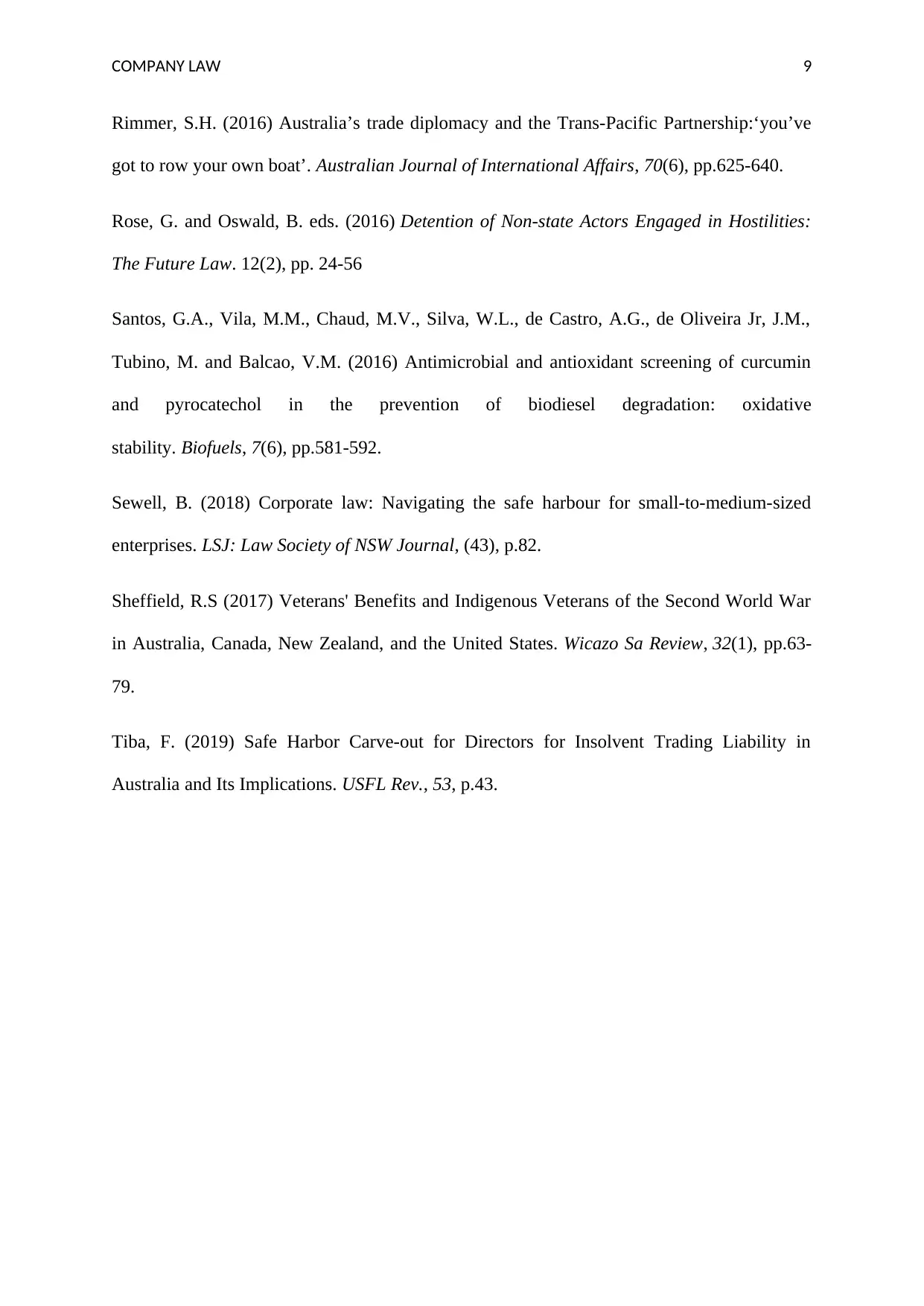
COMPANY LAW 9
Rimmer, S.H. (2016) Australia’s trade diplomacy and the Trans-Pacific Partnership:‘you’ve
got to row your own boat’. Australian Journal of International Affairs, 70(6), pp.625-640.
Rose, G. and Oswald, B. eds. (2016) Detention of Non-state Actors Engaged in Hostilities:
The Future Law. 12(2), pp. 24-56
Santos, G.A., Vila, M.M., Chaud, M.V., Silva, W.L., de Castro, A.G., de Oliveira Jr, J.M.,
Tubino, M. and Balcao, V.M. (2016) Antimicrobial and antioxidant screening of curcumin
and pyrocatechol in the prevention of biodiesel degradation: oxidative
stability. Biofuels, 7(6), pp.581-592.
Sewell, B. (2018) Corporate law: Navigating the safe harbour for small-to-medium-sized
enterprises. LSJ: Law Society of NSW Journal, (43), p.82.
Sheffield, R.S (2017) Veterans' Benefits and Indigenous Veterans of the Second World War
in Australia, Canada, New Zealand, and the United States. Wicazo Sa Review, 32(1), pp.63-
79.
Tiba, F. (2019) Safe Harbor Carve-out for Directors for Insolvent Trading Liability in
Australia and Its Implications. USFL Rev., 53, p.43.
Rimmer, S.H. (2016) Australia’s trade diplomacy and the Trans-Pacific Partnership:‘you’ve
got to row your own boat’. Australian Journal of International Affairs, 70(6), pp.625-640.
Rose, G. and Oswald, B. eds. (2016) Detention of Non-state Actors Engaged in Hostilities:
The Future Law. 12(2), pp. 24-56
Santos, G.A., Vila, M.M., Chaud, M.V., Silva, W.L., de Castro, A.G., de Oliveira Jr, J.M.,
Tubino, M. and Balcao, V.M. (2016) Antimicrobial and antioxidant screening of curcumin
and pyrocatechol in the prevention of biodiesel degradation: oxidative
stability. Biofuels, 7(6), pp.581-592.
Sewell, B. (2018) Corporate law: Navigating the safe harbour for small-to-medium-sized
enterprises. LSJ: Law Society of NSW Journal, (43), p.82.
Sheffield, R.S (2017) Veterans' Benefits and Indigenous Veterans of the Second World War
in Australia, Canada, New Zealand, and the United States. Wicazo Sa Review, 32(1), pp.63-
79.
Tiba, F. (2019) Safe Harbor Carve-out for Directors for Insolvent Trading Liability in
Australia and Its Implications. USFL Rev., 53, p.43.
1 out of 10
Related Documents
Your All-in-One AI-Powered Toolkit for Academic Success.
+13062052269
info@desklib.com
Available 24*7 on WhatsApp / Email
![[object Object]](/_next/static/media/star-bottom.7253800d.svg)
Unlock your academic potential
Copyright © 2020–2026 A2Z Services. All Rights Reserved. Developed and managed by ZUCOL.




